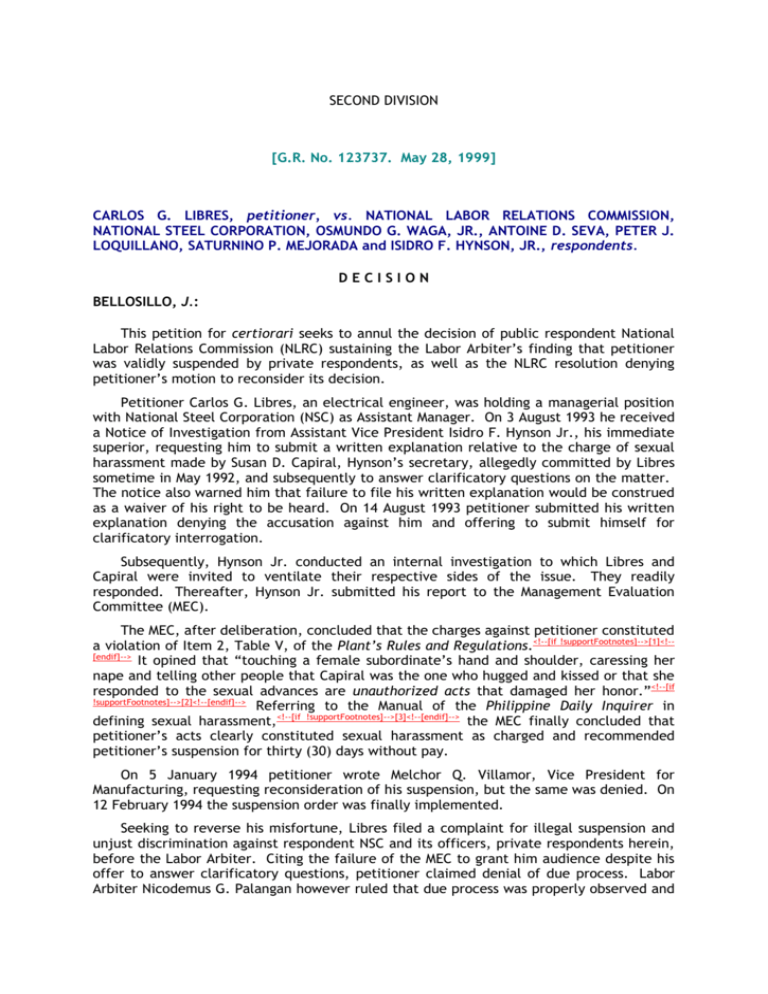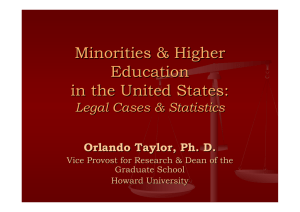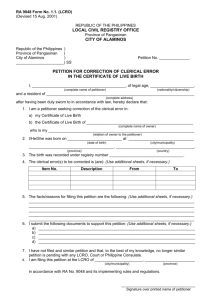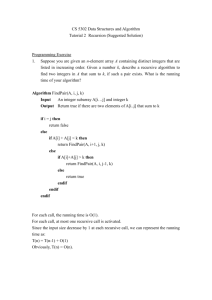
SECOND DIVISION
[G.R. No. 123737. May 28, 1999]
CARLOS G. LIBRES, petitioner, vs. NATIONAL LABOR RELATIONS COMMISSION,
NATIONAL STEEL CORPORATION, OSMUNDO G. WAGA, JR., ANTOINE D. SEVA, PETER J.
LOQUILLANO, SATURNINO P. MEJORADA and ISIDRO F. HYNSON, JR., respondents.
DECISION
BELLOSILLO, J.:
This petition for certiorari seeks to annul the decision of public respondent National
Labor Relations Commission (NLRC) sustaining the Labor Arbiter’s finding that petitioner
was validly suspended by private respondents, as well as the NLRC resolution denying
petitioner’s motion to reconsider its decision.
Petitioner Carlos G. Libres, an electrical engineer, was holding a managerial position
with National Steel Corporation (NSC) as Assistant Manager. On 3 August 1993 he received
a Notice of Investigation from Assistant Vice President Isidro F. Hynson Jr., his immediate
superior, requesting him to submit a written explanation relative to the charge of sexual
harassment made by Susan D. Capiral, Hynson’s secretary, allegedly committed by Libres
sometime in May 1992, and subsequently to answer clarificatory questions on the matter.
The notice also warned him that failure to file his written explanation would be construed
as a waiver of his right to be heard. On 14 August 1993 petitioner submitted his written
explanation denying the accusation against him and offering to submit himself for
clarificatory interrogation.
Subsequently, Hynson Jr. conducted an internal investigation to which Libres and
Capiral were invited to ventilate their respective sides of the issue. They readily
responded. Thereafter, Hynson Jr. submitted his report to the Management Evaluation
Committee (MEC).
The MEC, after deliberation, concluded that the charges against petitioner constituted
a violation of Item 2, Table V, of the Plant’s Rules and Regulations.<!--[if !supportFootnotes]-->[1]<!-[endif]-->
It opined that “touching a female subordinate’s hand and shoulder, caressing her
nape and telling other people that Capiral was the one who hugged and kissed or that she
responded to the sexual advances are unauthorized acts that damaged her honor.”<!--[if
!supportFootnotes]-->[2]<!--[endif]-->
Referring to the Manual of the Philippine Daily Inquirer in
defining sexual harassment,<!--[if !supportFootnotes]-->[3]<!--[endif]--> the MEC finally concluded that
petitioner’s acts clearly constituted sexual harassment as charged and recommended
petitioner’s suspension for thirty (30) days without pay.
On 5 January 1994 petitioner wrote Melchor Q. Villamor, Vice President for
Manufacturing, requesting reconsideration of his suspension, but the same was denied. On
12 February 1994 the suspension order was finally implemented.
Seeking to reverse his misfortune, Libres filed a complaint for illegal suspension and
unjust discrimination against respondent NSC and its officers, private respondents herein,
before the Labor Arbiter. Citing the failure of the MEC to grant him audience despite his
offer to answer clarificatory questions, petitioner claimed denial of due process. Labor
Arbiter Nicodemus G. Palangan however ruled that due process was properly observed and
that there was a positive finding of sexual harassment to justify petitioner’s suspension.
He pointed out that there was no substantial inconsistency between the narration of
complainant Capiral and petitioner regarding the incident in the evening of May 1992. The
Labor Arbiter found that aside from a few facts which were controverted by Capiral in her
complaint-affidavit, petitioner’s admissions approximated the truth; consequently, he
ruled that the MEC was correct in including that sexual harassment had indeed transpired.
The Labor Arbiter observed that petitioner should welcome that his penalty was only for
suspension of thirty (30) days as opposed to termination imposed in Villarama v. NLRC and
Golden Donuts.<!--[if !supportFootnotes]-->[4]<!--[endif]--> In this recourse petitioner maintains that
public respondent grievously erred amounting to lack or excess of jurisdiction in finding
that he committed sexual harassment justifying his suspension, and in concluding that he
was afforded due process.
Petitioner argues that the issue of sexual harassment was not adequately considered
as he noted that the finding of the NLRC was made without proper basis in fact and in
law. He maintains that the NLRC merely adopted the conclusions of the Labor Arbiter
which in turn were simply derived from the report of the MEC. Petitioner primarily
disputes the failure of the NLRC to apply RA No. 7877, “An Act Declaring Sexual
Harassment Unlawful in the Employment, Education or Training Environment and for
Other Purposes,” in determining whether he actually committed sexual harassment. He
asserts that his acts did not fall within the definition and criteria of sexual harassment as
laid down in Sec. 3 of the law.<!--[if !supportFootnotes]-->[5]<!--[endif]--> Specifically, he cites public
respondent’s failure to show that his acts of fondling the hand and massaging the
shoulders of Capiral “discriminated against her continued employment,” “impaired her
rights and privileges under the Labor Code,” or “created a hostile, intimidating or
offensive environment.”<!--[if !supportFootnotes]-->[6]<!--[endif]-->
Petitioner also contends that public respondent’s reliance on Villarama v. NLRC and
Golden Donuts<!--[if !supportFootnotes]-->[7]<!--[endif]--> was misplaced. He draws attention to victim
Divina Gonzaga’s immediate filing of her letter of resignation in the Villarama case as
opposed to the one year delay of Capiral in filing her complaint against him. He now
surmises that the filing of the case against him was merely an afterthought and not borne
out of a valid complaint, hence, the Villarama case should have no bearing on the instant
case.
As regards his assertion that he was not afforded due process, petitioner would point
to his demand for personal confrontation which was brushed aside by the MEC. He argues
strongly that in rejecting his plea, the MEC clearly denied him an opportunity to be heard
and present his side.
The issues raised in this petition require this Court to delve into the findings of fact by
the public respondent. We have ruled in a litany of cases that resort to judicial review of
the decisions of the NLRC under Rule 65 of the Rules of Court is confined only to issues of
want or excess of jurisdiction and grave abuse of discretion on the part of the tribunal
rendering them. It does not include an inquiry on the correctness of the evaluation of
evidence, which served as basis for the labor official in determining his conclusion.
Findings of fact of administrative officers are generally given finality.<!--[if !supportFootnotes]->[8]<!--[endif]-->
Nonetheless, the Court shall discuss the matter if only to emphasize that the
contentions of petitioner are definitely without merit.
Petitioner assails the failure of the NLRC to strictly apply RA No. 7877 to the instant
case. We note however, that petitioner never raised the applicability of the law in his
appeal to the NLRC nor in his motion for reconsideration. Issues or arguments must chiefly
be raised before the court or agency concerned so as to allow it to pass upon and correct
its mistakes without the intervention of a higher court. Having failed to indicate his effort
along this line, petitioner cannot now belatedly raise its application in this petition.
Republic Act No. 7877 was not yet in effect at the time of the occurrence of the act
complained of. It was still being deliberated upon in Congress when petitioner’s case was
decided by the Labor Arbiter. As a rule, laws shall have no retroactive effect unless
otherwise provided, or except in a criminal case when their application will favor the
accused.<!--[if !supportFootnotes]-->[9]<!--[endif]--> Hence, the Labor Arbiter have to rely on the MEC
report and the common connotation of sexual harassment as it is generally understood by
the public. Faced with the same predicament, the NLRC had to agree with the Labor
Arbiter. In so doing, the NLRC did not commit any abuse of discretion in affirming the
decision of the Labor Arbiter.
Petitioner next trains his gun on the reliance by the NLRC on Villarama and claims it
was erroneous. We rule otherwise and hold that it was both fitting and appropriate since
it singularly addressed the issue of a managerial employee committing sexual harassment
on a subordinate. The disparity in the periods of filing the complaints in the two (2) cases
did not in any way reduce this case into insignificance. On the contrary, it even invited
the attention of the Court to focus on sexual harassment as a just and valid cause for
termination. Whereas petitioner Libres was only meted a 30-day suspension by the NLRC,
Villarama, in the other case was penalized with termination. As Mr. Justice Puno
elucidated, “As a managerial employee, petitioner is bound by more exacting work
ethics. He failed to live up to his higher standard of responsibility when he succumbed to
his moral perversity. And when such moral perversity is perpetrated against his
subordinate, he provides a justifiable ground for his dismissal for lack of trust and
confidence. It is the right, nay, the duty of every employer to protect its employees from
oversexed superiors.”<!--[if !supportFootnotes]-->[10]<!--[endif]--> Public respondent therefore is correct
in its observation that the Labor Arbiter was in fact lenient in his application of the law
and jurisprudence for which petitioner must be grateful and not gripe against.
Petitioner further claims that the delay in instituting the complaint shows that it was
only an afterthought. We disagree. As pointed out by the Solicitor General, it could be
expected since Libres was Capiral’s immediate superior. Fear of retaliation and backlash,
not to forget the social humiliation and embarrassment that victims of this human frailty
usually suffer, are all realities that Capiral had to contend with. Moreover, the delay did
not detract from the truth derived from the facts. Petitioner Libres never questioned the
veracity of Capiral’s allegations. In fact his narration even corroborated the latter’s
assertion in several material points. He only raised issue on the complaint’s protracted
filing.
On the question of due process, we find that the requirements thereof were
sufficiently complied with. Due process as a constitutional precept does not always and in
all situations require a trial type proceeding. Due process is satisfied when a person is
notified of the charge against him and given an opportunity to explain or defend himself.
The essence of due process is simply to be heard, or as applied to administrative
proceedings, an opportunity to explain one’s side, or an opportunity to seek a
reconsideration of the action or ruling complained of.<!--[if !supportFootnotes]-->[11]<!--[endif]--> It is
undeniable that petitioner was given a Notice of Investigation informing him of the charge
of sexual harassment as well as advising him to submit a written explanation regarding the
matter; that he submitted his written explanation to his superior, Isidro F. Hynson Jr.;
that Hynson Jr. further allowed him to air his grievance in a private session; and, that
upon release of the suspension order made by the MEC petitioner requested its
reconsideration but was denied. From the foregoing it can be gleaned that petitioner was
given more than adequate opportunity to explain his side and air his grievances.
The personal confrontation with the MEC officers, which he requested, was not
necessary. The parties had already exhaustively presented their claims and defenses in
different fora. As stated in Homeowners Savings and Loan Association v. NLRC, litigants
may be heard through pleadings, written explanations, position papers, memoranda or
oral arguments.<!--[if !supportFootnotes]-->[12]<!--[endif]--> Petitioner has been afforded all of the above
means to air his side. Due process was therefore properly observed.
WHEREFORE, the petition is DISMISSED, no grave abuse of discretion having been
committed by public respondent National Labor Relations Commission in upholding the
suspension of petitioner Carlos G. Libres as justified and in accordance with due process.
Consequently, its decision of 28 August 1995 as well as its resolution of 31 October 1995 is
AFFIRMED.
SO ORDERED.
Puno, Mendoza, Quisumbing, and Buena, JJ., concur.
<!--[if !supportEndnotes]-->
<!--[endif]-->
<!--[if !supportFootnotes]-->[1]<!--[endif]-->
“Any unauthorized act or omission or misrepresentation of
any sort which results in loss, damage or injury to the person or property of any employee
or the company, whether intentional or through negligence,” Item 2, Table V of the
Plant’s Rules and Regulations.
<!--[if !supportFootnotes]-->[2]<!--[endif]-->
Annex “C-12,” Petition for Certiorari, MEC Report.
<!--[if !supportFootnotes]-->[3]<!--[endif]-->
“Sexual harassment is defined as unwelcome or uninvited
sexual advances, requests for sexual favors and other verbal or physical conduct of sexual
nature with any of the following elements: (1) x x x x (2) x x x x (3) such conduct as
unreasonably interferes with the individual’s performance at work, or creates an
intimidating hostile or offensive working environment,” PDI Manual as cited in Annex “C13,” Petition for Certiorari, MEC Report.
<!--[if !supportFootnotes]-->[4]<!--[endif]-->
G.R. No. 106341, 2 September 1994, 236 SCRA 280.
<!--[if !supportFootnotes]-->[5]<!--[endif]-->
“Work, education or training-related sexual harassment is
committed by an employer, employee, manager, supervisor, agent of the employer,
teacher, instructor, professor, coach, trainor, or any other person who, having authority,
influence or moral ascendancy over another in a work or training or education
environment, demands, requests or otherwise requires any sexual favor from the other,
regardless of whether the demand, request or requirement for submission is accepted by
the object of said Act,” Sec. 3, RA No. 7877.
<!--[if
!supportFootnotes]-->[6]<!--[endif]-->
“In a work-related environment, sexual harassment is
committed when: (1) x x x x (2) x x x x (3) the above acts would discriminate against one’s
continued employment, impair one’s rights and privileges under the Labor Code, and
create a hostile, intimidating or offensive environment,” Sec. 3, par. (a) , RA No. 7877.
<!--[if !supportFootnotes]-->[7]<!--[endif]-->
G.R. No. 106341, 2 September 1994, 236 SCRA 280.
<!--[if !supportFootnotes]-->[8]<!--[endif]-->
ComSavings Bank v. NLRC, G.R. No. 98456, 14 June 1996, 257
SCRA 307; Madlos v. NLRC, G.R. No. 115365, 4 March 1996, 254 SCRA 248; Sta. Fe
Construction Co. v. NLRC, G.R. No. 101280, 2 March 1994, 230 SCRA 593; San Miguel
Corporation v. Javate, Jr. G.R. No. 54244, 27 January 1992, 205 SCRA 469.
<!--[if !supportFootnotes]-->[9]<!--[endif]-->
RA No. 7877 was approved on 14 February 1995. Complaint
before the Labor Arbiter was filed 24 February 1994 and reached the NLRC on 28 October
1994.
<!--[if !supportFootnotes]-->[10]<!--[endif]-->
Id., p. 289.
<!--[if !supportFootnotes]-->[11]<!--[endif]-->
Philippine Long Distance Company v. NLRC, G.R. No. 71499,
19 July 1989, 175 SCRA 437.
<!--[if !supportFootnotes]-->[12]<!--[endif]-->
G.R. No. 97067, 26 September 1996, 262 SCRA 406.





